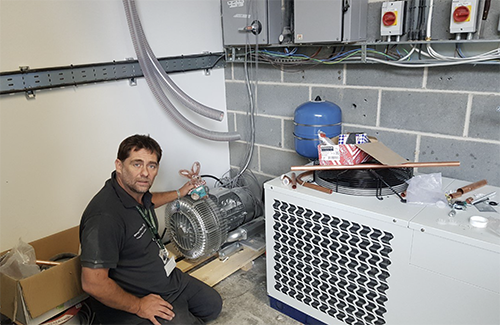

With the rise of social media, it’s not uncommon practice to utilise this online platform as a job seeking method. Recently, HPM has noticed that there has been a surge in aspiring plumbers and heating engineers using Twitter as a way to advertise that they’re looking for an apprenticeship, but with such fierce competition how do you stand out? What are employers looking for?
We spoke to Nathan Gambling (@betateach), a plumbing and heating lecturer and installer about what he looks for in an apprentice.
Nathan said: “So this is what I advise students: bear in mind most students at college are on the full-time diploma course. This is where they will get their C&G certificates for exams and workshop practical.
“Colleges have far more diploma students than the apprentices they teach on the NVQ course. These students sometimes become despondent because they soon find out that unless they find an employer to take them on – so that they can then achieve their work based learning assessments – they will never gain a full qualification.
“This never used to happen. The only students who used to attend college were apprentices. However, because the mandatory age of education has increased from 16 to 18 I think awarding bodies implemented the diploma course. Very lucrative for the awarding bodies who receive sign up fees to their courses.
“So, what do I tell my students:
- All CVs look the same to an employer e.g. “I’m hard working, good at timekeeping.” Great…but they need to prove this somehow. Ideally, work experience. Any work experience, for example working in the fast food service, can prove this and be included on a CV and covering letter
- The covering letter is the secret source. CVs are formulaic, so a covering letter provides you with the opportunity to stand out
- Look to include in your covering letter something of value you can give to the prospective employer e.g:
- You may be good with code and can help improve their website
- You may be good with social media and can help promote website traffic and increase followers
- You may have family members involved with van leasing
- You may know some potential customers. (I once taught a student whose dad coached a high-level football club…contacts into the football world, with them all having luxury bathrooms installed is a big bonus for a prospective employer)
- You may have excellent written skills or be great with graphic design – once again, a way to improve a prospective employer’s website, marketing, etc.
“I also tell students to sign up to trade magazines, like HPM, and follow them on social media. It’s important to ‘get current’ and see what is happening in industry. If you can allude to a current topic in the industry it suggests to the prospective employer they you’re already engaging with industry and have passion.
“I sometimes use the scenario with students that a previous student I taught read an article how part L building regs requires control of our heating systems (boiler interlock) and that room thermostats are required. The article then goes onto say how the elderly struggle with digital thermostats and prefer the analogue type where you just turn a dial.
“The student decided to conduct their own survey on this matter. They included in their covering letter how they had read the article and did this survey and that indeed this was the case. They also discovered that one of them actually needed a new system and was looking for an installer.
“The employer was impressed with this and realised the student was passionate, forward thinking, and they were offered the apprenticeship.
“The biggest hurdle for a prospective apprentice is convincing a prospective employer that taking one is beneficial. Remember, most employers are sole traders in this industry.
“Despite the rhetoric that we need to train more skilled workers and there is a skill shortage (which, in my opinion, is bull, as we train 40,000 plus who never get into industry) the problem is as above. How do we convince employers/sole traders to take on an apprentice? Some are on the tipping point e.g. they are thinking about it. It is these employers which may be persuaded with a good covering letter.
Best of luck to all those seeking an apprenticeship!”
Nathan Gambling
HPM is social! Find is on Twitter, Facebook and Instagram
You can also sign up to our digital newsletter, Plumbzine for weekly news, products, events and training updates.
